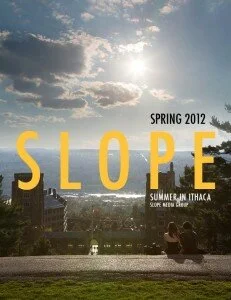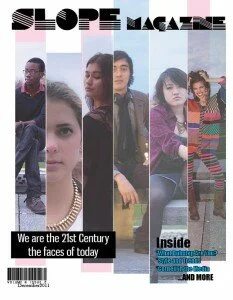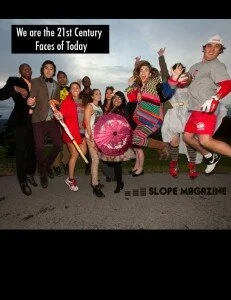Dispatches from (A)mended America: A Conversation About Race
February 7, 2011 —Everyone is a racist. At least, that’s the perspective of a character in Dispatches from (A)mended America, a documentary play about race. Usually, the stereotype of a “racist” brings to mind someone who treats others as inferior because of race. Dispatches gives us an alternate definition: “Racism is being able to benefit from the way society is set up.” By this token, everyone is a racist. The only way to fight back is to question these benefits, forcing people to analyze their actions.
After six months of performances in New York City, Godfrey L. Simmons, Jr., and Brandt Adams ’06 brought Dispatches to Beverly J. Martin Elementary School in Ithaca on February 5. They, along with six other actors, portrayed twenty characters, culled from hundreds of interviews. Simmons and Adams, who both hail from Virginia, spent two months traveling in the Southern states after Barack Obama’s election in 2008, interviewing Americans about the significance of the event.
“We knew that [Obama’s election] meant something very different to both of us. We wanted to see what it meant to other people,” Adams, who is white, said of the motivation behind the piece.
The play’s staging was simple: a large circle of folding chairs in the gymnasium, where the audience sat. Actors crossed through the center of the circle, with different characters identified by changes in vocality. Simmons and Adams, who played themselves, interjected narration for context. The actors performed with scripts in hand, with text revised as recently as two days before. Adams regarded this as a positive factor, as the conversation about race they hoped to start will be ongoing and not set in stone.
“There will be things that will be set eventually, but I do think that there is some part of it—and I cannot tell you what part of it that is—that will always evolve,” he said.
For Jim Wallert, one of the actors, the constant revision and evolution of the script was a new experience. Wallert, who is a member of the Epic Theatre ensemble, along with director Ron Russell, said that this was his first production with a changing script and focus. Regardless of where it is performed, the play is a “terrific conversation-starter,” according to Wallert.
Jeni Josephson, an audience member and employee of Finger Lakes Migrant Health, agreed. “It was beautiful. I think they did a great job,” she said. “They were able to take a whole lot of different perspectives and open up a conversation so that people can reach back into their own experiences.”
Josephson discussed a past incident where she dealt with racism. While teaching Spanish in Elmira, Josephson, who is Jewish, told her students she would be missing school for Pesach, a religious holiday. When Josephson returned to school, “the classroom was filled with swastikas,” she said. The incident forced her to confront discrimination in her classroom, fostering a discussion among her students.
The Ithaca performance also sparked candid discussion. After the performance, small groups met over dinner to discuss their reactions. Attendees were encouraged to share their own experiences on index cards. This process was helpful to Adams and Simmons, as well as to twenty-one Cornell students who will follow their lead to create their own documentary piece, to be presented in April.
“I’ve had a lot of experience with race and racism. I’m Mexican-American [and] I have family and friends who are undocumented,” Jorge Silva ’12 said. “My views of race have been shaped as a result of that.”
Silva has been involved in other social justice theatre, including Latins Anonymous at the Schwartz Center. “I decided that if I was going to continue doing theatre, I wanted to make sure that whatever I was doing meant something,” he said. “We saw real people in real situations express themselves on a topic that isn’t discussed, in a brave manner, and in a safe manner.”
He noted that the project at Cornell is still in its early stages. The group is deciding on the scope of the project (whether it will include the Ithaca community or just Cornell), and aspects of Cornell history they would like to include. Cornell, for instance, was the first university to integrate living spaces.
The students are hopeful that it will open up discussions about race relations on the Cornell campus. As a character in Dispatches said, “You can’t get beyond race. You have to go through it.”



